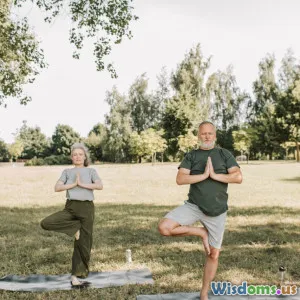
From Skeptic to Devotee: My Journey with Yoga Philosophy
7 min read Explore a personal journey from skepticism to devotion through yoga philosophy and its transformative impact. (0 Reviews)
From Skeptic to Devotee: My Journey with Yoga Philosophy
Introduction
For most of my life, the idea of yoga conjured images primarily of physical postures rather than a rich, philosophical tradition. As someone rooted in logic and skepticism, the expansive world of yoga philosophy seemed more like esoteric jargon than a practical guide to life. Yet, what began as mild curiosity blossomed over several years into a deep devotion that transformed my perspective on life, purpose, and well-being.
This article shares my personal journey with yoga philosophy — the principles that captivated me, the misconceptions I overcame, and the profound ways these teachings reshaped my worldview. If you’ve ever felt skeptical about spiritual philosophies or wondered if yoga is “just exercise,” this story might inspire a fresh perspective.
Understanding Skepticism: Why I Was Resistant
Skepticism toward spiritual systems is common in today’s evidence-driven culture. I questioned:
- How could ancient texts written thousands of years ago be relevant to modern complexities?
- Isn’t yoga just a trendy exercise routine popularized in the West?
- What practical benefits could philosophy — often abstract and metaphorical — genuinely offer?
These doubts were compounded by contemporary portrayals that often narrowed yoga down to aesthetics, depriving it of deeper meaning. This perspective left me dismissing the wider yogic tradition that includes ethics, meditation, and self-inquiry — not just asana poses.
First Glimmers of Interest: Experiencing Yoga’s Philosophical Roots
My transformation began when I attended a workshop on the Yoga Sutras of Patanjali, a text codified around 200 BCE that encapsulates yoga philosophy. Beyond postures, it outlines an eightfold path toward self-realization — including ethical guidelines (Yamas and Niyamas), breath control (Pranayama), meditation (Dhyana), and states of consciousness.
One quote struck me deeply: “Yoga is the cessation of the fluctuations of the mind” (Yoga Sutras 1.2). This definition resonated more than any stereotype about yoga. It hinted at a systematic method to develop mental clarity and peace — something I constantly sought amid everyday stress.
Here, I realized yoga philosophy was not mystical nonsense; it was an ancient psychological science meant to cultivate inner stability and freedom.
Diving Deeper: Key Philosophical Principles That Changed My Life
1. The Yamas and Niyamas — Ethical Foundations
These are moral imperatives that form the bedrock of yogic living:
- Yamas (restraints): non-violence, truthfulness, non-stealing, continence, non-greed
- Niyamas (observances): purity, contentment, austerity, self-study, surrender to a higher principle
Adopting these principles taught me discipline and introspection. For instance, practicing contentment (Santosha) shifted my mindset from perpetual dissatisfaction towards gratitude, which studies show correlates with increased happiness.
2. Pratyahara — Withdrawal of the Senses
In a hyper-connected world, training the mind to detach from sensory overload felt radical. Using Pratyahara techniques, like mindful breathing or focused meditation, helped me reduce anxiety and enhance concentration.
Science supports this: research in mindfulness meditation shows measurable decreases in stress hormone cortisol and improvements in attention spans.
3. The Nature of the Self and Liberation
Yoga philosophy introduces the concept of Purusha (pure consciousness) and Prakriti (nature, matter). Recognizing this distinction fostered detachment from transient worries and identification with something more enduring.
This was seductive not because of mystical claims, but because it invited me to view my identity in a broader, more resilient light.
Real-World Impact: From Theory To Practice
Overcoming Stress and Anxiety
Before yoga philosophy, I relied heavily on distractions or transient pleasures to cope with stress. Yoga’s emphasis on mind control and ethical living equipped me with tools to face challenges with equanimity.
A few months into consistent meditation and ethical evaluation, I noted a marked reduction in reactive anger and increased emotional balance. This corroborated numerous studies linking yoga and meditation to improved mental health.
Connecting with a Larger Community
Engaging with yoga philosophy also introduced me to a community of seekers — not necessarily religious, but committed to self-growth. This collective energy fostered accountability and enriched my experience beyond solitary study.
Embracing Lifelong Inquiry
Yoga philosophy encourages Svadhyaya (self-study) and openness to learning. This mindset rekindled my intellectual curiosity rather than stifling it.
Exploring diverse texts — from the Bhagavad Gita to modern interpreters like B.K.S. Iyengar — provided an evolving framework to apply ancient wisdom adaptively.
Conclusion: Yoga Philosophy as a Bridge Between Skepticism and Devotion
My journey from skepticism to devotion was neither instantaneous nor blind faith. It was an unfolding of awareness, grounded in personal experience and practical benefits rather than dogma.
Yoga philosophy provided a time-tested framework for cultivating clarity, ethical living, and resilience — qualities invaluable in our complex modern life. It showed me that ancient wisdom traditions, when approached thoughtfully, are not relics to be dismissed, but tools that can enhance our mental and emotional well-being.
For those skeptical about philosophy or spiritual traditions, I invite you to explore yoga philosophy not as a belief system to accept wholesale, but as an experiential science worth testing. The shift I experienced is a testament to the power of informed inquiry paired with consistent practice.
Maybe your journey, like mine, will move from doubt to devotion — not through surrender, but through discovery.
Rate the Post
User Reviews
Popular Posts




















